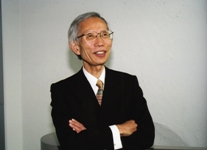
Les droits de l’homme en ce début du XXIe siècle
Professeur invité au Collège de France en mars 2008, professeur de droit et de sciences politiques à l’Université de Tokyo, Yasuaki Onuma est spécialiste des crimes de guerre. Il expose, dans cet entretien en anglais, l’objet de ses travaux de recherche sur les droits de l’homme.
Yasuaki Onuma a donné, le 8 et le 14 mars 2008, deux conférences au Collège de France, dans le cadre du séminaire de Mireille Delmas-Marty. Ses interventions étaient consacrées aux droits de l'homme dans une perspective « trans-civilisationnelle » : une recherche étonnante sur l'étendue de « l'universalité » des droits de l'homme, sur l'importance des normes internationales actuelles et sur les habitudes et les valeurs communes des hommes, d'un bout à l'autre du monde, à l'heure de la mondialisation.
Dans cette émission, Yasuaki Onuma part de l'idée, en droit international, que les conceptions d'expansion de la modernité occidentale ont changé. La déclaration de Vienne de 1993, qui tentait de faire le point sur la question juridique des droits de l'homme, depuis l'adoption de la déclaration universelle des droits de l'homme de 1948, a marqué un tournant historique par son programme d'action, adopté par plus de 170 États. Les États signataires se sont engagés à promouvoir le respect universel, l'observation et la protection des droits de l'homme. Le monde est dorénavant multipolaire ; aussi le professeur japonais Onuma pense-t-il que le droit des droits de l'homme changera.
Quel usage est-il fait de la question des droits de l'homme par les États, les ONG, les multinationales ?
Aujourd'hui, il semble impossible d'appartenir à une civilisation de manière exclusive ; un cadre cognitif « trans-civilisationnel » s'est imposé. Yasuaki Onuma dénonce l'idée, habituellement admise, que ce qui est universel est occidental et que la particularité renvoie à ce qui est non-occidental. Il identifie, dans un proche avenir, de nouveaux types de conflits possibles, déstabilisants pour l'ordre international. À titre d'exemple, des conflits peuvent naître du décalage entre une information et une économie généralement traitées de manière « transnationale » et un système de normes et de contrôle, lié au système des États souverains. Pour lui, les droits de l'homme ont été compris en fonction du cadre de la société internationale du XXesiècle ; mais aujourd'hui, celle-ci a changé.

Yasuaki Onuma est professeur de droit et de sciences politiques à l'université de Tokyo. Il est également spécialiste de droit public, de l'histoire du droit international, de l'histoire des relations internationales, du rapport entre le droit international et les civilisations, de la responsabilité japonaise dans les crimes de guerre, de la comparaison des systèmes d'immigration et de la minorité coréenne au Japon.
Il est membre de très nombreuses associations, parmi lesquelles l'American Society International Law (1999), l'International Human Rights Law Association (2000), la Japanese Association of Sociology of Law (2002), l'International Human Rights Law Association (2005).
En savoir plus
- Yasuaki Onuma, professeur à l'université de Tokyo
- Yasuaki Onuma professeur invité au Collège de France
- Yasuaki Onuma, The Tokyo War Crimes Trial : an international Symposium ( Kodansha International, 1986)
- Yasuaki Onuma, A normative approach to War : peace, war and justice in Hugo Grotius (Clarendon Press, Oxford, 1993)
English version
On the 8th and 14th of March 2008, Yasuaki Onuma gave two lectures at le Collège de France within the framework of Mireille Delmas-Marty’s seminar. His lectures were dedicated to Human Rights in a “trans-civilisational” perspective: his amazing research work focuses on the extensive universality of human rights, on the importance of current international standards and on the habits and values shared by all men, throughout the world, at the time of globalization.
In this programme, Yasuaki Onuma emits the idea that, in international law, the views of Western modernity and of its spreading have changed. 1993 Vienna Declaration tried to clarify the legal question of Human Rights since the Universal Declaration of Human Rights in 1948. The adoption of its policy plan by more than 170 States was a historical turning-point. The States signatory to the agreement committed themselves to the promotion of universal respect, the observance and the protection of Human Rights. The world has become multipolar, therefore, Japanese Professor Onuma thinks that Human Rights Law will change.
How is the question of Human Rights put forward by States, NGOs and multinational companies?
Nowadays it seems impossible to belong exclusively to one civilization. A “trans-national” cognitive framework has been set. Yasuaki Onuma denounces the received idea which equates universality with the Western world or specificity with the non Western world. He thinks that in the next coming years, there may emerge new types of conflicts that could upset the international order. For instance, he says that conflicts can be caused by the discrepancy between a “trans-national” treatment of information and of economy and a system of standards and control depending upon the system of Sovereign States. He explains that Human Rights have been conceived of within the framework of XXth century International Society, but this society has changed.
Yasuaki Onuma is a Law and Political Sciences Professor at Tokyo University. He also specialized in public law, in the history of international law, the history of international relations, as well as he studied the link between international law and civilizations, the Japanese responsibility for war crimes, the comparison between immigration systems and the Korean minority in Japan. He is the member of numerous associations such as American Society International Law (1999), International Human Rights Law Associations (2000), the Japanese Association of Sociology of Law (2002), and International Human Rights Law Association (2005).